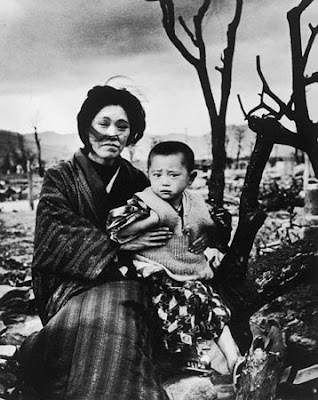 In a time so awash in dramatic events, especially the last couple of weeks and the debt ceiling/financial markets bombast — worse Wall Street week in three years, the US downgraded from AAA to AA+ — and this morning came reports of 31 US GIs killed in an Afghan helicopter crash, a commemoration of a momentous-monsterous event can be easily overlooked, or neglected.
In a time so awash in dramatic events, especially the last couple of weeks and the debt ceiling/financial markets bombast — worse Wall Street week in three years, the US downgraded from AAA to AA+ — and this morning came reports of 31 US GIs killed in an Afghan helicopter crash, a commemoration of a momentous-monsterous event can be easily overlooked, or neglected.
This case — the 66th anniversary of the US bombing of Hiroshima.
Yet why in the words of Harry Truman: “The atom bomb was no great decision. It was merely another powerful weapon in the arsenal of righteousness.”
(Illustration found here).
In fact, I’d forgotten myself until a scan of antiwar.com this morning revealed a shitload of Hiroshima-related stories.
And I always post something myself on the anniversary of a most-definite twisted-turning-point in human history when the US let the nuclear cat put of the bag — if not the US, eventually the Soviets or somebody else would have done the trick, although, with the US there’s much-much-more hypocrisy involved than with the others — but the whole scene escaped me this year.
A sad reflection on the state of everything. (Along with the news, I’m going offline next week with a trip out of town, and I’ve been engaged with more-than-a-little thought on that — details in a later post this weekend).
So right in line with forgetfulness of this anniversary, or it being shoved aside for other so-called more important pieces of life, one of those articles spotted at antiwar was from Greg Mitchell, former editor of the former Editor&Publisher, on his new book, ‘Atomic Cover-Up: Two U.S. Soldiers, Hiroshima & Nagasaki and The Greatest Movie Never Made.’
‘Atomic Cover-Up‘ is about how the US “suppressed the only film footage shot in the atomic cities, by both Americans and Japanese, for decades. The shocking cover-up even extended to MGM and Hollywood — and to President Truman. And there was no WikiLeaks to get the film aired.”
In the piece, found originally at The Nation, Mitchell describes the coming-together of the book, including first-person accounts and interviews with people actually involved, and one of those is Lt. Col. (Ret.) Daniel A. McGovern, who directed the US military film-makers in 1946 and was the center of the drama for nearly 40 years.
This passage says it all:
“I always had the sense,†Dan McGovern told me, “that people in the Atomic Energy Commission were sorry we had dropped the bomb.
The Air Force — it was also sorry.
I was told by people in the Pentagon that they didn’t want those [film] images out because they showed effects on man, woman and child….
They didn’t want the general public to know what their weapons had done — at a time they were planning on more bomb tests.
We didn’t want the material out because…we were sorry for our sins.â€
Read the whole piece as it’s a most-fascinating view of how horror can easily be suspended from the consciousness of a shitload of people for a long time.
And a parting point from the article about Japanese antinuclear activist, Tsutomu Iwakura:
Iwakura found that the color footage, recently declassified, might be at the National Archives.
A trip to Washington, DC, verified this.
He found eighty reels of film.
About one-fifth of the footage covered the atomic cities.
According to a shot list, reel #11010 included, for example: “School, deaf and dumb, blast effect, damaged Commercial school demolished School, engineering, demolished.School, Shirayama elementary, demolished, blast effect Tenements, demolished.â€
The film had been quietly declassified a few years earlier, but no one in the outside world knew it.
An archivist there told me later, “If no one knows about the film to ask for it, it’s as closed as when it was classified.â€
No telling about other bad shit still unknown.
See a well-made video of the re-entactment of the Hiroshima bombing here.
How could one even think/consider creating and then using such a device.